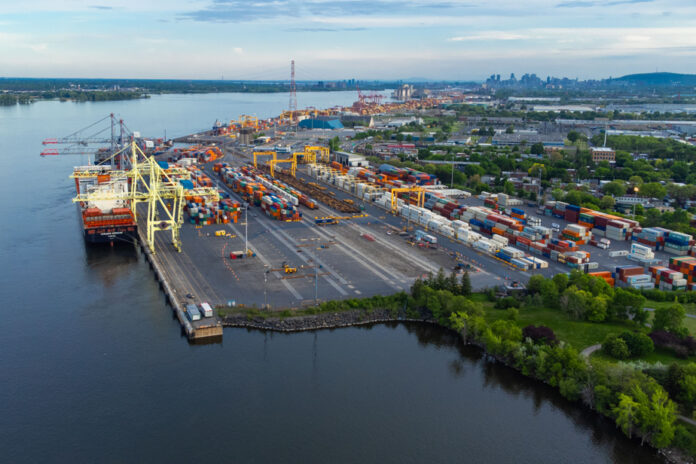(Ottawa and Montreal) The Montreal Port Authority (MPA) is far from alone in stamping its feet at the Trudeau government’s slowness in confirming that it will invest in the Contrecœur port terminal project. Business people are getting impatient too. And this impatience goes beyond the borders of Quebec.
The Toronto Region Board of Trade adds its voice to those of the Conseil du patronat du Québec and Manufacturiers et Exportateurs du Québec in urging the Trudeau government to announce without delay that it supports the financing of the industrial container terminal project in Contrecoeur, a request that the APM has been trying to advance for months.
The financial structure of Contrecœur was turned upside down by inflation. Result: The original invoice no longer holds. The MPA is making an urgent appeal to Ottawa to ensure that this project, deemed essential for the supply chain in Montreal and the east of the country, sees the light of day.
“The efficient movement of goods is essential for Toronto and Southern Ontario, where 40% of Canada’s manufacturing base is located. The expansion of the Port of Montreal is applauded by Toronto as an important first step in addressing the competitiveness and congestion issues we face,” said Toronto Region Board of Trade President and CEO Janet De Silva, in an email to La Presse.
Ms. De Silva’s comments demonstrate beyond a shadow of a doubt that Ontario and Quebec have the same reading of the importance of this project to the country’s economy and supply chain. Nearly 30% of the goods that end up in Ontario pass through the Port of Montreal.
In a speech he gave this week before the Chamber of Commerce of Metropolitan Montreal, the President and CEO of the MPA, Martin Imbleau, addressed the issue of a rapprochement with Ontario.
“They just thought, ‘We’re going to develop our own maritime strategy.’ My teams and I met with representatives of the Ministry of Transportation in Ontario and we will help them develop their maritime strategy,” also noted Mr. Imbleau.
Last month, the MPA secured an additional $75 million from Quebec to complete the project. But Ottawa is slow to announce its colors. Talks are ongoing between PAM leaders and the Trudeau government. According to our information, a sum of around 150 million is at the heart of the negotiations. We were hoping for an announcement in the last federal budget, tabled on March 28. But the disappointment was there. Finance Minister Chrystia Freeland did not announce any money in her budget.
According to Mr. Imbleau, agreement must be reached by the end of the month so that the project can be launched towards the end of the year, as planned.
“The schedule must be maintained because in 2027, we will reach maximum capacity,” said the president and CEO of the APM on Tuesday.
The Contrecœur project, which is to see the light of day in the suburbs of Montreal, will cost more than the estimate ranging from 750 to 950 million previously mentioned. Mr. Imbleau would not put a number on the order of cost overruns, which he blames on inflationary pressures. Along with the funding, the MPA is still waiting for the green light from the federal government to encroach on the critical habitat of the copper redhorse, a fish threatened with extinction.
By releasing a new envelope in its budget tabled last month, the Legault government supports the project to the tune of 130 million. The Canada Infrastructure Bank (CIB) is also to offer $300 million in loans. The MPA and its private partner – which should be selected during the summer – will complete the financial package.
According to the president of the Conseil du patronat du Québec, Karl Blackburn, the Contrecœur project is crucial at a time when major efforts are being made to consolidate the supply chain on the North American continent and when we are trying to reduce any reliance on authoritarian regimes like China and Russia.
“Supply chains have been heavily affected in recent years. But we know that they are important for the vitality and growth of our economy. The Contrecœur project is critical for our supply chains, particularly in Quebec. And such projects take a long time to complete. We have a hard time explaining the slow progress of the file on the part of the federal government, ”he said.
The President and CEO of Manufacturers and Exporters of Quebec, Véronique Proulx, agrees. “We took part in the consultations about Contrecœur. This project is important. And it is important that the federal government step up the pace and provide financial support to the Port of Montreal for this project. If this project is delayed, it will affect our supply chains,” she said.
Professor of transport management at HEC Montréal, Jacques Roy believes that time is running out for all the players involved in this file.
“Container traffic is on the rise in Montreal. Of course, you should not wait until full capacity is reached before launching the project. We are in the normal horizon where we should start carrying out this work, ”he analyzed.
He also said he was surprised to see the delays surrounding the financial package and the participation of the federal government. “The short answer is yes. It seems like a pretty natural project to me. It’s squarely in federal court. I’m surprised he hasn’t answered the call yet. Ports don’t have a ton of leeway to go to market and fund themselves. »















